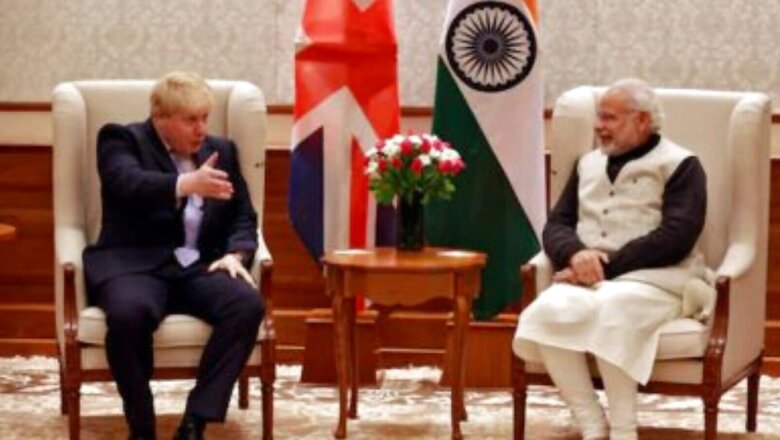
views
At their virtual summit in May this year, Prime Ministers Narendra Modi and Boris Johnson, with the perceived opportunities created by Brexit for both countries, had unveiled a 10-year road map to transform India-UK ties. They discussed the COVID-19 situation, their ongoing cooperation in fighting the pandemic, including the partnership in producing vaccines. Johnson had announced an investment of £240 million by the Serum Institute in its vaccine business in the UK.
The recent sharp controversy over UK’s initial procrastination over including Covishield as approved vaccine and subsequently the COVID vaccination certificates (CoWIN) issued by the Indian government to allow doubly vaccinated Indian nationals to travel to the UK without quarantine restrictions seemed out of tune with the spirit of the vaccine partnership and the 10-year road map based on a new optic of an expanding future relationship founded on mutual trust and respect between the two countries.
While the British viewed the delay on their side as process-driven, with change of regulations initially for green countries and subsequently for amber and red countries, the Indian public interpreted it as the usual British condescension towards India tinged with racism. Eventually, the government of India lost patience and was compelled to impose reciprocal measures on incoming UK travellers. Following this, the UK has included India in the list of approved countries for quarantine-free entry of Indians doubly vaccinated with Covishield, just as France, Germany, Italy and many European countries had done earlier without this kind of fuss.
This unfortunate squabble points to underlying currents that quake India-UK ties. The summit meeting had launched an enhanced trade partnership (ETP), which would include negotiating a comprehensive free trade agreement (FTA) and an interim trade agreement for delivering early gains. Concluding pre-FTA discussions by year-end was envisaged, with an interim deal by mid-2022 and discussions on an FTA to continue thereafter. This time-table is likely to slip.
ALSO READ | India Must Bridge the Last-mile Gap on FTAs for an Economic Take-off
Apparently, the British side is going about systematically in defining its asks by consulting all stakeholders but the perception on our side is one of British tardiness. As against the readiness of the Indian side after having done its preparatory work to move forward quickly on early deliverables, the British side is planning for more time. Our commerce minister’s visit to the UK appears to have been postponed for this reason.
The migration and mobility partnership pact to facilitate legal movement of students and professionals and also enhance cooperation in combating illegal migration seems to have run into difficulties too. The hitch comes from the British side wanting India to implement its part of the agreement even as the former is not fulfilling its part and actually resiling from some key provisions. Once again, we have a tussle of wills and an erosion of trust.
Ties Marred by Lack of Trust
There is no doubt that India-UK relationship is marred by lack of trust, certainly on the Indian side. The historical reasons for this continue to be fed by visible British partiality for Pakistan, the space given to anti-Indian activities on British soil by resident pro-Khalistani and pro-Pakistan elements, well-organised demonstrations allowed in front of the Indian High Commission in the name of right to protest, unmindful of the tensions they create, and India-baiting even in parliament by British politicians dependent on votes of concentrated local communities of Pakistani origin in several constituencies.
The British authorities, including the country’s intelligence services, are no doubt aware of the nexus between Pakistani and Khalistani elements sponsored by the ISI to target the High Commission and denigrate India, but seem to believe that there is no political price to pay in terms of relation-building with India, which is an error if the desire to transform ties is genuine.
The readiness of the British parliamentary authorities to include debates on the farmers’ agitation in India or human rights in Kashmir when there should be far more meaningful issues which touch the core of its interests that the UK parliament should be discussing for the national good. The explanation that because of the Indian diaspora in the UK what is India’s internal affair becomes UK’s internal affair, which then justifies reactions in the UK, as stated by the previous UK foreign minister, is not convincing. India has noted that Khalistani elements have become very active in Scotland. It would be absurd to believe that the vast majority of Indians in the UK back such debates on India’s internal affairs. Why the UK establishment chooses to pander to a few rabid anti-India elements in the diaspora would suggest a desire to maintain some pressure points on India, believing that the cost of it in terms of Indian reactions is bearable. This reflects a great power complex that still relies on past power equations that no longer exist.
Even if one were to accept that democratic polities carry such unpalatable ways of functioning in the name of freedoms, the government ministers can surely use such occasions to put things in the right perspective. This would allow some elements to vent themselves but the government would assume the responsibility to counter false propaganda. As it happens, this has not been the case.
On the farmers’ protests, the reply of the UK foreign minister, welcoming the debate, was not satisfactory. The government reply on the debate on human rights in Kashmir was right in stating that the UK treats Kashmir as India’s internal affair and it is for India and Pakistan to resolve the issue through negotiations, but the sting was in the caveat about “taking into accounts the wishes of the people of Kashmir”. This was the formulation that the US used until recently but has now abandoned it, as it brings in the issue of “self-determination” in another language. This also implies that Pakistan still has a locus standi in J&K and that decisions taken by the Indian government relating to J&K are not in accordance with wishes of the Kashmiri people. The UK can take this position if it wishes but it does not concord with the ambition to transform the India-UK ties.
ALSO READ | ‘Quarreltine’ with India Ends as UK Gives In
The Onus is on Britain
On top of this, the UK’s Afghanistan policy is seen as serving Pakistan’s interests. It would seem that unlike the Americans who engage India on Afghanistan even if their policy has seriously injured our interests, the UK has largely preferred not to do so. The white-washing of the ‘country boys’ with a ‘code of honour’ who should not be treated as an enemy and no hasty judgment should be made on their attitude towards women was how the British Chief of Defence Staff publicly described the Taliban on General Bajwa’s word.
The British have had for long a tolerant attitude towards the Taliban and have been willing to accept their rule so long as the West and the UK are not targeted by Islamic terrorists, a position that the US also took in the Doha Agreement. This would seem to limit the degree of cooperation that India can hope to obtain from the UK and the US in countering terrorism from across our western border as that would inevitably involve cooperating with us on Pakistan-sponsored terrorism against India, for which they are not politically ready.
The reality also is that there are many friends of India in UK political, economic and social circles. Industrialists and businessmen of Indian origin have achieved remarkable success in Britain. The number of Indian students in the UK is going up again. The people to people contacts are deep. The cultural and linguistic ties are strong. Britain remains an influential global player as a permanent member of the UN Security Council, a technically advanced society, possessing high-end military technologies, with the world’s biggest financial centre in London, a home to world-class educational institutions, and so on.
There are many foundations to build on provided the British are able to discard some entrenched attitudes from the past and some assumptions about the equations between the two countries, shed their historical bias in favour of Pakistan at India’s cost, curb anti-Indian lobbies at home who do harm to mutual understanding, do some sums anew about the role of India in contributing to addressing the challenges emerging from the Indo-Pacific area that seek to change international realities. The burden is on the British establishment as a whole, especially its bureaucracy which wields enormous influence.
The ambition of Prime Ministers Modi and Johnson has been expressed in the 10-year road map. The opportunity to realise it will be missed if the task of trust building is not pursued more single-mindedly.
The author is Former Foreign Secretary. He was India’s Ambassador to Turkey, Egypt, France and Russia. The views expressed in this article are those of the author and do not represent the stand of this publication.
Read all the Latest News , Breaking News and IPL 2022 Live Updates here.


















Comments
0 comment